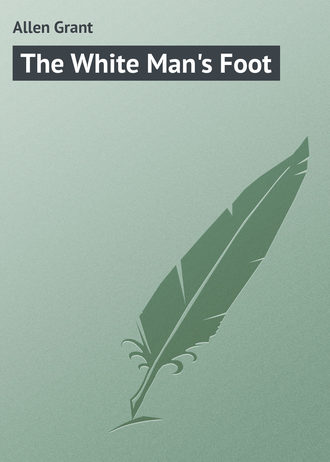 полная версия
полная версияThe White Man's Foot
"Now, look sharp: make a dash for it!" the officer said, in a muffled voice. "Out into the open, and seize the girl at once! Never mind the men. Carry her off in your arms before they know what's happening, and back here again to the rope immediately."
I stood and watched on the further bank of that fiery strait. The moon's light meanwhile had been growing each instant dimmer and dimmer. The greater part of the orb was already obscured. The moment of totality was rapidly approaching. Kea, warned by a word from her uncle, stood up in her bridal dress and faced the awful flood of surging lava. Kalaua, by her side, began once more to drone out in long notes his monotonous chant. He flung a handful of taro, with a solemn incantation, into the mouth of the volcano. "See, Pélé," he cried, "we bring thee thy daughter-in-law. See, Maloka, we bring thee thy chosen bride. At the stroke of midnight, at the appointed hour, thou hast put out the lamp in heaven, the moon. This is thy signal: we mortals obey it. O humpbacked favourite of Pélé the long-haired, the bride will go into the bridegroom's chamber. – Maloka, hold up thy hands for thy handmaid! leap, Kea, leap, into the arms of your husband!"
I looked and trembled. Kea stepped forward with marvellous courage. Through the dim light of the ruddy volcanic fires I could see her draw back her white veil from her face, and make as though she would meet some lovers embraces. Then the last corner of the moon disappeared all at once in darkness from my sight, and for half a moment, at that critical point, I saw and heard nothing with distinctness or certainty.
Next instant, as if by magic, a weird red glare illumined the scene. Great arms of fire lunged forth spasmodically from the open crater. Maloka had leaped forward with his scorching hands, to claim his bride in fiery wedlock. The eruption had at last begun in real earnest. Huge volumes of flame darted up with commingled black smoke towards the vault of heaven. A lurid light hung upon the massive clouds overhead. Stones and ashes and cinders fell wildly around us. The crater had broken loose in its fiercest might. The rivers of liquid fire were welling up all round and bursting their bounds with majestic grandeur.
And in the midst of all, by the uncertain light of that deep red glare, I could just see Frank and the friendly sailors bearing off Kea in her bridal robe, half fainting, half unwilling, before the very eyes of the astonished and amazed Hawaiians. Our party had rushed upon them from behind, unawares, at the very first instant of total eclipse, and seized her in their arms, in the act to jump, from the circling ring of baffled natives.
Thank heaven, then, they had been in time; in time to save her from the cruel volcano and the crueller superstition of her heathen ancestors.
"Back, now, back, to the chasm and your horses!" the officer cried in a tune of command, at the top of his voice, as Kalaua and the natives, recovering after a moment from their first shock of surprise, and gathering together into an angry knot, began to show signs of attempting an organized resistance. "Carry off the girl between you, there, at the top of your speed. No time to lose! The lava's rising." He pointed his revolver. "And if one of you heathen brown fellows come a single step nearer," he added with a menace, "I'll put a bullet through his ugly black head, as soon as look at him."
Kalaua leaped forward with a wild and almost inarticulate cry of rage and disappointment. "Seize them, friends," he shrieked aloud in his hoarse Hawaiian. "Kill them! Tear them to pieces! How dare they interfere with the bridals of Maloka?" Bat even as he spoke, a river of lava burst suddenly forth from the mouth of the seething crater, and spread a broad stream of liquid fire between the infuriated natives and the little band of Kea's gallant protectors.
"Run, run," Kalaua cried. "Down the other road! By the black rocks! Intercept them at the gulley. Kill them! kill them! They're Pélé's enemies! However you do it, kill them, kill them!"
The officer, unheeding their savage threats, stalked on to the chasm, and pointed firmly but quietly to the rope that still spanned it. Kea, dazed and frightened, yet graceful and light of limb as ever, clasping it hard in her small fair hands, swung herself across to my side with native ease, while the sailors held the ends of the cable on the bank opposite. Then one by one the others followed swiftly in turn, with admirable discipline, in spite of the shower of ashes, till only Frank was left by himself beyond the deep abyss of boiling lava.
"How will he ever get over?" I cried, looking across at him in alarm and terror.
"Oh, don't be afraid, old fellow!" Frank shouted back cheerily. "Leave that to me! I'm as right as ninepence. Thank goodness, I can hang from a rope like a monkey!" And with a hasty movement, he began to roll the end of the cable tight around his waist and to tie it firmly in a slip-knot to his sturdy shoulders.
How he could ever drop himself down so steep an abyss with flame below, I had no notion. On the other hand, I knew he dared not trust the bamboo again. It had bent already too severely with his weight, almost indeed to the point of breaking; and half charred as it now was with the constant heat ascending for ever from that subterranean furnace, it would no doubt have snapped short in the middle by this time, if he had been foolish enough to attempt crossing by its aid a second time over the few yards of chasm that intervened to divide us.
Frank however had a device of his own. Planting his feet hard against the edge of the precipice, he swung himself off like a monkey, with the rope grasped hard in his two hands; and even as he fell, kicking off from the side, he gripped it quickly hand over hand, till he brought himself up with wonderful agility level with the opposite side where we were all standing. Half a dozen stout arms were extended at once to pull him safe to solid land; and in another moment we all stood secure, with Kea in our midst, a recovered party, on the brink of the crater, undeterred by anything more serious in its way than an ordinary everyday volcanic outburst.
"Off to the horses!" the officer cried aloud; and before I knew what was happening, two of the sailors had seized me in their arms, and were hurrying me away at a break-neck pace up the steep zig-zag to the level of the summit.
In the ravine, we came, sure enough, upon the horses, tethered and guarded by a couple of sailors. "Mount," the officer cried with military promptitude: and the men mounted, not exactly, I must confess, with the ease or grace of cavalry orderlies. I mounted myself, too, with what skill I could command, taking into consideration that broken leg of mine; and giving the trusty little ponies their heads, we rode at full speed in breathless haste, but in long Indian file down the narrow bridle path to the base of the mountain.
I knew well the gully where the two roads joined, and where Kalaua had threatened to meet us in hostile array with his proscribed band of heathen followers. It was an ugly spot, with great overhanging rocks to defend the pass, and if they got there first, I knew we should have to fight them for possession of Kea. All depended now upon the swiftness and sureness of foot of our ponies. To be sure, we were mounted, while Kalaua and his party were all on foot; but then, most of us had been greatly delayed by the necessity for recrossing the chasm on the rope bridge in order to get at our path and our horses; and even apart from this unavoidable stoppage, very few ponies, at the best of times, can cover the ground faster than an unimpeded Hawaiian. Those fellows can run like a deer or greyhound. I trembled for the result if they held the rocks above the fort in full force. They could hurl down stones upon us from the heights with infinite ease, crush us like locusts as we passed beneath them: even fire-arms there would be useless against a party that held the pass in any numbers.
On, on, we rode, in fear and trembling. The volcano now was all in full blast. Ashes and pumice stone kept falling around us. Smoke and steam obscured our way. But the dangers of nature frightened us little in comparison; what we dreaded most was the desperate onslaught of the enraged Hawaiians.
As we drew near the fort however I breathed again more freely. Not a sign of Kalaua was anywhere to be seen. We rode along, cautiously, under the overhanging rocks. No Hawaiian showed his grim black head above or below us. Then Kea, with a shriek, guessed in a moment exactly what had happened. "The lava has overwhelmed them!" she cried, clasping her hands together in girlish trepidation. "They are dead! They are dead! My uncle! My people! Pélé will not be robbed of her victim at any rate. The lava has burst forth in one great flood and swallowed them."
And indeed, when we reached a turn in the bridle path, and looked up the ravine down whose rugged centre the other road descended tortuously, a terrible sight met our astonished eyes. The summit of the mountain was now one red and lurid mass of living fire. Through the gully along whose course Kalaua and his followers had plunged in the first darkness of the total eclipse to cut off our retreat, a vast river of red-hot lava was pouring onward resistlessly in huge fiery cataracts. We could see the fierce stream descending apace over ledges of rock like a flood of molten metal poured forth from the smelting-bowl; we could see it engulfing trees and shrubs and stumps and boulders in its plastic mass; we could see it overwhelming the whole green ravine with one desolating inundation of fire and ashes. "Quick, quick," I cried; "ride, ride for your lives. You may think volcanoes are nothing much to be frightened of; but, I tell you, a volcano in such a temper as that is not by any means a thing to be trifled with. She's mad with rage. The stream's coming down the valley straight for the fork; take at once to the ridge, and ride on for your lives. Ride, ride across country, anyhow, to the Hornet at Hilo!"
"And me!" Kea cried, looking back at me appealingly, for she headed our little hasty procession. "What's to become of me? Of me, who have brought it all by my sin upon you! Of me, for whose sake Pélé is so angry! Of me, who roused her wrath by stealing away her victim! Leave me here to die! Kalaua is dead! My people are swallowed! I meant myself to die in their place, but you wouldn't let me! Leave me here to perish! If you don't leave me, Pélé in her anger will pursue you on your way to the sea itself, to the foot of the mountain!"
"Ride on!" I answered. "Ride on to Hilo. Is this a time to make plans for the future? We'll discuss all that, Kea, on the deck of the Hornet."
That evening, on board the British gunboat, lighted up by the terrific glare overhead, we had time to reflect what it all meant, and to feel ourselves free to think and speak again.
"What will you do now, Kea?" I asked the poor girl, as she sat there, trembling, in a small cabin chair, while the red flames still illumined for miles and miles the summit and flanks of Mauna Loa. "Do you wish to stop here in your own island?"
Kea looked up at me with a half terrified glance. "I wish," she said in a low voice, "to be as far away from Pélé and Maloka as possible… Kalaua is dead. Pélé has devoured him… I will leave my husband on my wedding night. I will go home to my father's people."
"That is best so," I answered quietly. "Hawaii is no place for such as you. I don't think Maloka will ever miss you. We will go on the Hornet away to Honolulu. There you can take passage with Frank and me on the next steamer for San Francisco, on your way home to dear, peaceful England."
"Why," Frank exclaimed, with a look of immense surprise, "you don't mean to say, Tom, you're going to turn your back upon a volcano – and in actual eruption, too, into the bargain!"
"Bother volcanoes!" I answered testily. "One may have too much of a good thing. I don't care if I never set eyes on another eruption as long as I live. So that's flat for you."
"Nonsense!" Frank promptly replied with spirit, refusing to desert an old friend in a moment of vexation. "That's all very well now, when you're annoyed with Pélé for misbehaving herself; but I'll bet you sixpence, in spite of that, you'll be off again before twelve months are over, exploring some other jolly crater in Sumatra or Teneriffe, or the Antarctic regions."
And sure enough, as I put the last finishing touches to these lines for press, the post brings me in a letter in an official envelope, "On Her Majesty's Service," informing me that the Lords Commissioners of the Admiralty have been graciously pleased to accept my suggested appointment for three years on a scientific mission to investigate the volcanic phenomena of Cotopaxi and other craters in the chain of the Andes. By the same post, I have also received a note from my sister, who is now stopping down at the Kentish rectory where Kea lives with her English relations, and who says, among sundry other pieces of domestic criticism, "What a dainty, charming, lovable girl your pretty little Hawaiian really is, Tom! So gentle and good-natured, and so sweetly pensive! I can hardly believe, myself, there's anything of the cannibal Sandwich Islander in her! She's as fair as I am, and quite as European in all her ideas and thoughts and sentiments. When she doesn't talk nonsense about Pélé, in fact, I almost forget she isn't one of ourselves, she's so perfectly English. But the rector says he can't allow her to teach in the Sunday school till she's quite got over that heathenish rubbish. By the way, I shouldn't be surprised if she and her Cousin Hugh were some day to make a nice little match of it, if only Hugh can ever persuade her that it wouldn't be bigamy, and that she isn't already duly married to some ugly, mythical, humpbacked creature of the name of Maloka."









